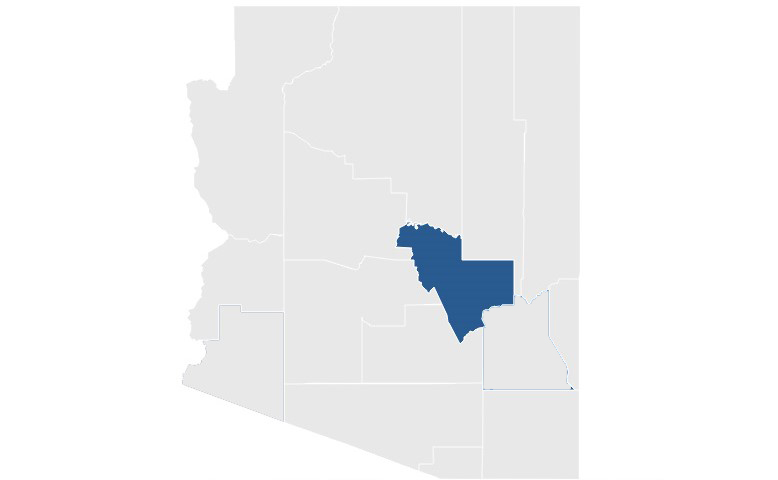Overview
The San Carlos Apache Indian Reservation spans Gila, Graham, and Pinal Counties in southeastern Arizona, roaming over a landscape that ranges from alpine meadows to desert that encompasses 1,834,781 acres of the San Carlos Apache Reservation.
Over one-third of the community’s land is forested (175,000 acres) or wooded (665,000) acres). Forest lands, with their jumbled topography, create a naturally superior habitat for many wildlife species causing elk, mule deer, turkeys, black bear and mountain lion to be at home on this reservation. A portion of the reservation is contiguous with the largest stand of ponderosa pines in the world.
The Apache’s are descendent of the Athabascan family who migrated to the Southwest in the 10th century. Over time, many bands of Apache were relocated to the reservation from their traditional homelands, which once extended through Arizona and New Mexico.
The region is blessed with a variety of geological, historic and recreational attractions. The temperate climate of the Reservation makes hunting for big and small game, such as elk, bighorn sheep, javelina, antelope and migratory birds, enjoyable in every season.
The San Carlos Apache Tribe was one of the 11 communities from the initial pilot of the U.S. Environmental Protection Agency (EPA) Closing America’s Wastewater Access Gap Community Initiative as part of President Biden’s Investing in America agenda. Originally launched in partnership with the U.S. Department of Agriculture (USDA) through the Rural Partners Network, the pilot initiative was launched in 2022. This program, along with historic funding through the Bipartisan Infrastructure Law, will help thousands of Americans access the wastewater infrastructure they need to thrive. Nearly two-thirds of the homes on the San Carlos Apache Indian Reservation do not have access to centralized wastewater systems and rely on inadequate onsite systems, like septic tanks. Through $2.5 million from the Closing America’s Wastewater Access Gap pilot, the Tribe has secured funding to pump septic tanks in need of servicing and is working with technical assistance providers to develop educational campaigns on wastewater management and septic system maintenance.
In addition, in 2023, USDA Rural Development (RD) and Health and Human Services – Health Resources and Services Administration (HRSA) started a collaboration and partnership to conduct a pilot project that would address maternal health issues with the Tribe. Through this partnership, a team is working with the San Carlos Apache Tribe in Arizona to develop strategies to understand community needs, address barriers and identify solutions to maternal health issues in those communities. RD and HRSA also plan to publish a resource guide in 2024 to provide lessons learned from the pilot and identify programs that can support rural communities addressing maternal health issues.
Rural Partners Network continues to work in partnership with the San Carlos Apache Tribe to address the community’s needs.
Priorities
-
Workforce Development
Community development
-
Investments
Renewable Energy Infrastructure
-
Housing/Housing Repairs
Employment
Rural Partners Network Contacts for San Carlos Apache Tribe
-

Jared Raymond
Community Liaison -

Charlene Fernandez
USDA Rural Development State Director


